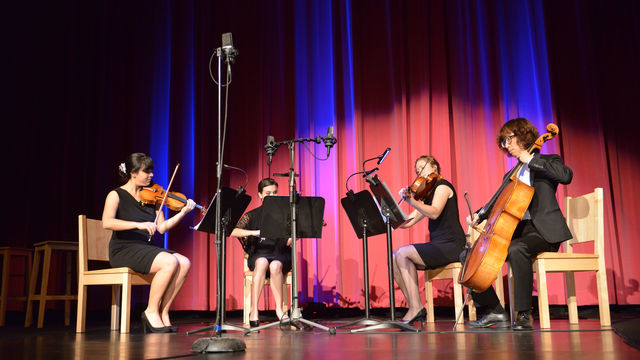
Q&A with Garrett Schoonover, a Musician in our Armenian Classical Music Concert
Every year the Hammer Museum and the UCLA Herb Alpert School of Music present a concert of Armenian classical music that commemorates the anniversary of the Armenian genocide. I spoke with one of the musicians participating in this year’s concert. The free concert is scheduled for Wednesday, April 18 at 7:30 p.m.
SW: Can you introduce yourself and the UCLA Armenian Music Ensemble?

GS: My name is Garrett Schoonover. I'm a second year graduate student at UCLA, studying vocal performance under Michael Dean. I'm originally from Salt Lake City, Utah, and I received my undergraduate in music composition from Westminster College, which is a small liberal arts school in Salt Lake City. Before enrolling in UCLA, I served in the military. Next week marks my 8th year in the military.
The Armenian Performance Ensemble is a group formed in partnership with UCLA and the Lark Musical Society in Los Angeles, a local Armenian cultural organization. The group gives young musicians, who may not have encountered Armenian music otherwise, an opportunity to share and preserve this rich, musical tradition.
How did you start singing Armenian music?
I was selected as the vocalist for the Armenian Performance Ensemble based on my previous knowledge of Persian Farsi. I started studying the Armenian text and learning about the emotions behind the music with my coach Vatsche Barsoumian, singer and head of the Lark Musical Society. We picked repertoire and transposed the pieces into keys that are comfortable in my range.
What inspires you to sing Armenian music?
Performing this music is rewarding. The harmonies and melodies of Armenian songs, as well as their content, are as complex and inspiring as those in the art-song literature of the West. I find it interesting that most of the melodies, stories, and imagery found in Armenian music have direct influences from Armenian folk songs.
Can you talk about the music you will be performing at the concert on April 18, 2018?
One of my pieces carries great emotional weight. Komitas’s "Oh Lake Raise Your Voice" is a plea from an Armenian man who stands beside a placid lake amidst the horrors of the Armenian genocide. The singer asks the lake why it does not share the people's outrage or sadness. Communion with the land is a recurrent theme in Armenian music. Although the song is short, its message is layered and powerful. The song’s composer, Komitas, is considered by many to be a martyr of the genocide. Although he physically survived the atrocity, his mind did not. He is known as one of the most prolific composers of Armenian music, since he set many songs in Western notation.
For the people who have never listened to Armenian music, what should they listen for? What should they expect?
I always encourage people to pry their eyes away from the translations provided in the programs and try to absorb as much meaning from the music as possible. The audience can always become familiar with the translations before or after the program. Even though this performance offers only a fragment of the larger Armenian story, I hope the audience will enjoy the music and reflect in this short moment.




